BANKSTERS AND BILLIONAIRES
PREPARE FOR THE WORST.
REVOLUTION IS IN LOOMING AND
WILL MARCH RIGHT DOWN WALL STREET FIRST.
"A series of recent polls in the US and Europe have shown a sharp
growth of popular disgust with capitalism and support for socialism. In May of
2017, in a survey conducted by the Union of European Broadcasters of people
aged 18 to 35, more than half said they would participate in a “large-scale
uprising.” Nine out of 10 agreed with the statement, “Banks and money rule the
world.”
*
"The
ruling class was particularly terrified by the teachers’ walkouts earlier
this year because the biggest strikes were organized by rank-and-file
educators in a rebellion against the unions, reflecting the weakening grip
of the pro-corporate organizations that have suppressed the class struggle
for decades."
*
“The yearly income of a typical US household dropped by a massive 12 percent, or $6,400, in the six years between 2007 and 2013. This is just one of the findings of the 2013 Federal Reserve Survey of Consumer Finances released Thursday, which documents a sharp decline in working class living standards and a further concentration of wealth in the hands of the rich and the super-rich.”
“The yearly income of a typical US household dropped by a massive 12 percent, or $6,400, in the six years between 2007 and 2013. This is just one of the findings of the 2013 Federal Reserve Survey of Consumer Finances released Thursday, which documents a sharp decline in working class living standards and a further concentration of wealth in the hands of the rich and the super-rich.”
*
"The American
phenomenon of record stock values fueling an ever greater concentration of
wealth at the very top of society, while the economy is starved of
productive investment, the social infrastructure crumbles, and working
class living standards are driven down by entrenched
unemployment, wage-cutting and government austerity policies, is part of
a broader global process."
*
"A defining expression of this crisis is the dominance of financial speculation and parasitism, to the point where a narrow international financial aristocracy plunders society’s resources in order to further enrich itself."
"A defining expression of this crisis is the dominance of financial speculation and parasitism, to the point where a narrow international financial aristocracy plunders society’s resources in order to further enrich itself."
‘Great Violence’ in Paris Anticipated as Police Staff Join Macron Protests
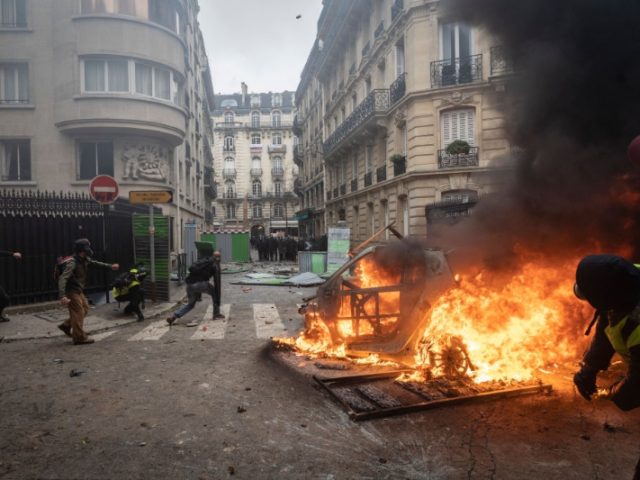
5:49
The French government expects the Gilets Jaunes (Yellow Vest) protests in Paris this weekend could be more violent than ever, despite President Emmanuel Macron buckling on fuel tax hikes.
The Élysée Palace, seat of President Emmanuel Macron, announced to French media they are expecting “great violence” on Saturday as Yellow Vest protestors have announced “Act IV” of their nearly four-week-long protest against the Macron regime that was initially sparked by a rise in fuel taxes, franceinfo reports.
According to the Élysée, they expect “a hard core of several thousand people” to arrive in Paris on Saturday with the intent to “break and kill.”
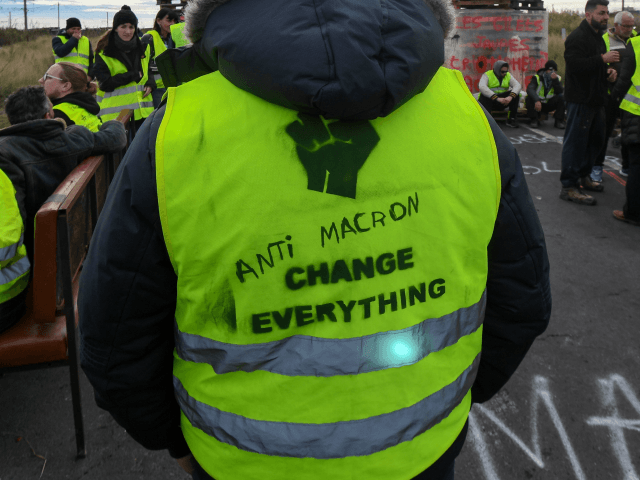
Yellow vests (Gilets jaunes) protesters block the road leading to the Frontignan oil depot in the south of France, as they demonstrate against the rise in fuel prices and the cost of living on December 3, 2018 / PASCAL GUYOT/AFP/Getty Images)
The government is taking the situation so seriously that they have ordered a general mobilisation of every police officer nationwide for Saturday including doubling the number of officers in Paris.
Rumours had also circulated on social media of the possibility that Macron has ordered the French military to be present in Paris on Saturday with some posting images and videos of what appear to be armoured personnel carriers being pre-deployed. The planned presence of armoured vehicles, a first since 2005, was later confirmed by the government.
The security for the public transit systems in the French capital will also be totally mobilised with the Paris public transport company RATP already planning to divert or cancel dozens of buses and other forms of public transit going to the Champs-Élysées, the Opera, and several other areas of the city.
On top of the regular police forces and Gendarmes, around 500 officers of the Directorate for Combating Irregular Immigration (SDLII) will be called upon and the Department of Local Security in Greater Paris (DSPAP) has also said their entire staff will be available to help.
The U.S. embassy in France has also put out a demonstration alert for Saturday’s protests saying, “Demonstrations may become violent, resulting in damage to property, including overturning vehicles and setting them on fire. Police responses may include water cannons and/or tear gas.”
The embassy recommended that Americans and others should avoid the protest areas, “shelter in place if in the areas affected,” and notify family for their safety.
While police have been called on to help quell the expected violence in the French capital, many are showing signs of sympathy to the Yellow Vests and their demands.
The Police Union Vigi Ministère de l’Intérieur has not only expressed support for the Yellow Vest movement but has called on members to go on an indefinite strike starting on Saturday, and join the Yellow Vests.
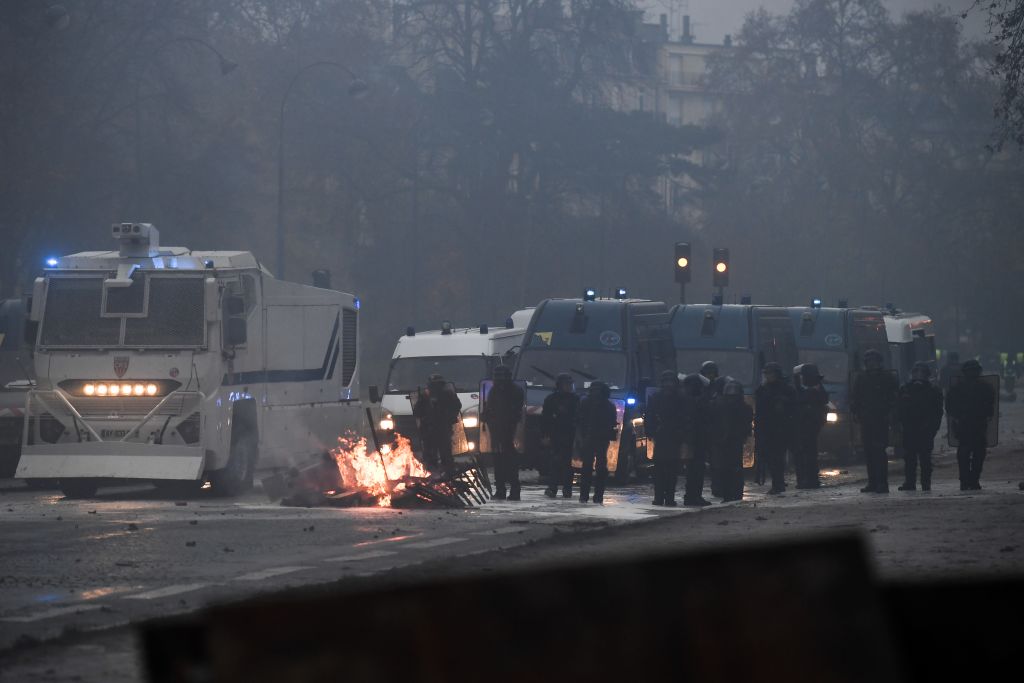
Policemen stand next to their vehicles near the Arc de Triomphe during a protest of Yellow vests (Gilets jaunes) against rising oil prices and living costs, on December 1, 2018 in Paris / ALAIN JOCARD/AFP/Getty Images
“It is time to organise legally and to be in solidarity with them, for the benefit of all,” the union said and added, “We know that we will have wounded and we fear to have dead among us.”
The strike will not affect active-duty officers, who are not allowed to strike by law but will impact support and administrative staff.
“Without the technical assistance and cooks, the companies of CRS [riot police] can be immobilised. Without the administrative assistants, services can be closed. Without the state workers, the maintenance of buildings and vehicles can no longer be done,” the union said.
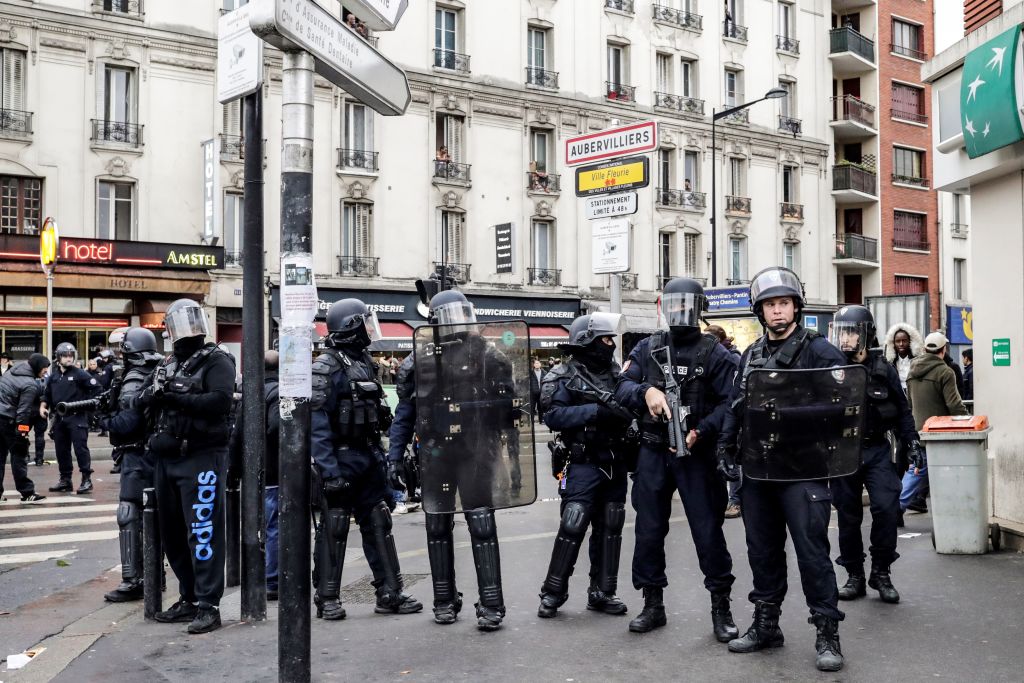
Riot Police stand near a metro station after charching high school students of the Lycee Professionnel Jean-Pierre Timbaud protesting against French government Education reforms on December 3, 2018 in the north of Paris’ suburb of Aubervilliers. / THOMAS SAMSON/AFP/Getty Images
While last weekend saw intense amounts of violence within Paris, vandalism has continued in the last several days, including in the department of Puy-de-Dôme where 95 per cent of all the motorway speed cameras have now been destroyed.
Vandalism and destruction have also been directed at tax collection offices across the country in recent weeks.
On Tuesday night, a tax office in the commune of Riom in central France was firebombed and only a day before a treasury office in Saint-Andiol, located near Avignon, was also firebombed.
Over the last three weeks, other tax offices have also been targetted, including the office in Limoges where a tractor was rammed into the front of the building to block the entrance and in the city of Cahors were Yellow Vests blocked entrance into the tax building and wrote “stop the racket” and “Merry Christmas and Good Taxes” on the walls.
With 67 per cent of the French believing that taxes are “too excessive,” tax collectors say they are now becoming fearful for their safety. In Poitiers last week, 200 tax collector staff were forced to flee the Yellow Vest protestors with one remarking, “The crowd screamed ‘fascists! collaborators!’ What is the next step? The guillotine? The scaffold?”
The tax officials are not the only ones fearing for their safety according to a source close to the presidency who said that all non-essential ministerial staff have been told to stay home on Saturday. “Everyone is scared. Fear for the stability of the institutions, for the continuity of the State, for the French, for our lives, for France,” the source said.
President Macron has already been confronted in public by Yellow Vest members while visiting the commune of Puy-en-Velay earlier this week. When the French leader attempted to greet the Yellow Vests he was met with shouts of “Démission!” or “Resign!” and was chased by Yellow Vests as his convoy attempted to leave the area.
While the original goal of the protests, to end a hike on fuel taxes, was met by Macron earlier this week, the Yellow Vest movement has burgeoned into what some have deemed as a true populist movement.
Breitbart London spoke to French author Renaud Camus and he claimed that the protests were borne of a much deeper problem in France.
“The problem is that the protesters themselves are so far too close to the picture, too much inside it, to realise that their fight is part of the general struggle against global replacementism, Davocracy,” Camus said, referring to the globalist elites who meet at the World Economic Forum every year in Davos, Switzerland.
He also noted that the protestors were “exemplified by the fact that practically all protesters belong to the indigenous, colonised, invaded, conquered people, the ‘natural’ French people.”
In the face of the past violence and expectation of more this weekend, 72 per cent of French still remain supporters of the Yellow Vest movement.
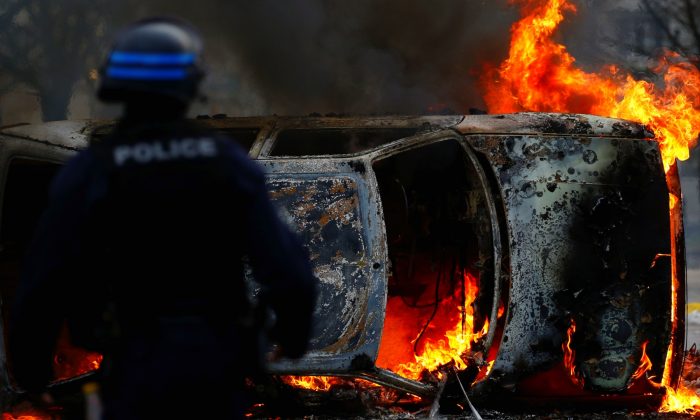
A French riot policeman stands next to a burning car as youth and high school students protest against the French government's reform plan, in Nantes, France, on Dec. 6, 2018. (Stephane Mahe/Reuters)
Fearing ‘Act IV’ of Unrest, France to Close Eiffel Tower, Louvre, at Weekend
December 7, 2018 Updated: December 7, 2018
PARIS—France will close the Eiffel Tower and other tourism landmarks in Paris and draft in thousands more security forces on Dec. 8, to stave off another wave of violent protests in the country over living costs.
With protesters from the “yellow vest” movement calling on social media for “Act IV”—a fourth weekend of protest—Prime Minister Edouard Philippe said 89,000 police nationwide would be deployed to stop a repeat of last Saturday’s mayhem across France.
About 8,000 of these would be deployed in Paris where rioters torched cars and looted shops off the famed Champs Elysees boulevard, and defaced the Arc de Triomphe with graffiti directed at President Emmanuel Macron.
Seeking to regain the initiative after weeks of civil unrest, the government appeared ready to offer concessions.
Philippe told the Senate he was open to new measures to help the lowest-paid workers while Finance Minister Bruno Le Maire said he was prepared to accelerate tax cuts for households and that he wanted workers’ bonuses to be tax-free.
“I am ready to look at all measures that will help raise the pay of those on the minimum wage without doing excessive damage to our competitiveness and businesses,” Philippe told the parliament’s upper house.
The rush of sweeteners to soothe public anger began with Philippe’s climb-down on fuel tax hikes, the first major U-turn of Macron’s presidency.
Yet, five days after the worst rioting central Paris has seen since 1968, all signs are that the government has failed to quell the revolt.
A repeat of last Saturday’s violence in Paris’s city center would deal a blow to the economy and raise doubts over the government’s survival.
Maintaining Order
Philippe said the state would do all it could to maintain order. Six first division football matches have been canceled.
Authorities in Paris ordered dozens of museums, tourism sites, shops and restaurants to close on Saturday, including the Eiffel Tower and Louvre.
Local officials in 15 areas around the capital were also asked to remove anything in the streets that could be used as projectiles.
“We are facing people who are not here to protest, but to smash and we want to have the means to not give them a free rein,” Philippe told TF1 television’s evening news program.
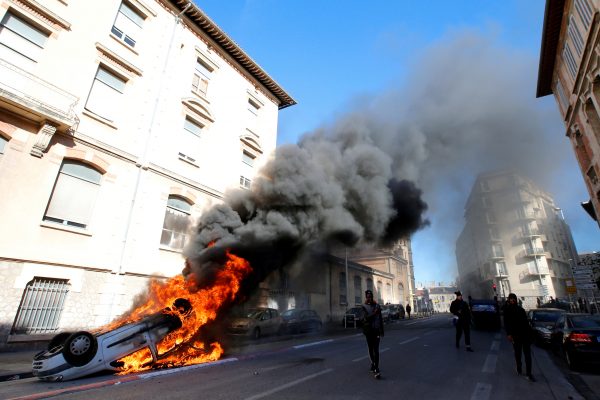
As well as increased police numbers, twelve armored vehicles belonging to the gendarmerie would be used, the first time in a French city since 2005 when riots broke out in the capital’s suburbs.
There is concern about far-right, anarchist and anti-capitalist groups like the Black Bloc, which have piggybacked off the ‘yellow vest’ movement.
The government is also considering using troops currently deployed on anti-terrorism patrols to protect public buildings.
Other towns across the country, including Bordeaux, ordered pre-emptive measures over concerns that protesters may opt to rally regionally rather than face tightened security in Paris.
On Facebook and across social media, protesters called for “Act IV”.
“France is fed up!! We will be there in bigger numbers, stronger, standing up for French people. Meet in Paris on Dec. 8,” read one group’s banner.
Concessions
The protests, named after the fluorescent safety jackets French motorists have to keep in their cars, erupted in November over the squeeze on household budgets caused by fuel taxes. Demonstrations swiftly grew into a broad, sometimes-violent rebellion against Macron, with no formal leader.
Their demands are diverse and include lower taxes, higher salaries, cheaper energy costs, better retirement provisions and even Macron’s resignation.
Reversing course on next year’s fuel-tax hikes have left a gaping 4 billion euro hole in the government’s 2019 budget which it is now searching for ways to plug.
Citing unnamed sources, Les Echos business daily said the government was considering delaying corporate tax easing planned next year or putting off an increase in the minimum wage.
The unrest has exposed the deep-seated resentment among non-city dwellers that Macron, whose popularity is now at about 20 percent, is out-of-touch with the hard-pressed middle class and blue-collar workers. They see the 40-year-old former investment banker as closer to big business.
Trouble is also brewing elsewhere for Macron. Teenage students on Thursday blocked access to more than 200 high schools across the country and clashed with security forces. About 700 students were arrested, French media reported.
Farmers and truckers are also threatening blockages and strikes from Sunday.
By Richard Lough and Marine Pennetier




No comments:
Post a Comment